The Hunt
Holland 1997 86min 35mm
Dir: Niek Koppen

The Hunt is the first documentary to explore, from the inside, the increasingly secretive, complex and fascinating world of English foxhunting set against the background of public outcry for the banning of this blood sport. The film follows the Ludlow Hunt in middle England over a full season.
Never before has a film crew been given such access to the workings of a hunt. The result is a shocking, at times moving, document which reveals incidents like the shooting of redundant hounds, the digging out and killing of foxes. Supported by a resonant score, this observational documentary will baffle you with its honesty, superb photography and its controversial images of a “sport” which, increasingly, has become a political issue.
Best Documentary: Newport International Film Festival 1998
Siki
Holland 1992 60min Video
Dir: Niek Koppen

In 1922 Louis M’Barick Fall was the first black man to win a world boxing title. Even today people on three continents can recount tales of Battling Siki, each presenting their own interpretation. Siki, the unbeatable African hero, the intelligent ‘savage’, the fighter against racial discrimination.
Siki the extravagant dandy, walking the boulevards of Paris with a leopard, the loving husband and father, the womaniser and bigamist. Using unique film and photo material, interviews and eyewitness accounts, Koppen creates an authentic and moving portrait of this mythical personality. Koppen will introduce the screening on Thursday 22nd and answer questions from the audience. Siki will be screened with The Man who would kill Kitchner on Tuesday 27th at 8pm.
Prix du Public, Vue sur les Docs, Marseilles 1992. Film Award, City of Utrecht 1992.
The Daily Nation
Holland 2000 70min 35mm
Dir: H Molenaar & J van Wijk

After making a series of portraits of single institutions in the “complex reality” of Africa, award winning directors, Hillie Molenaar and Joop van Wijk, now shed light upon the successful Kenyan newspaper The Daily Nation. Focussing on the way in which it symbolizes the history and present day reality of post colonial Africa. The Daily Nation gives a revealing view of the biggest and most modern newspaper in East Africa.
The story of the newspaper is about the ongoing wrestle with objectivity and independence as Kenya’s only source of independent information and is a constant reminder of the importance of the independent press. The film shows how the editors and journalists, printers and street vendors operate as a well-oiled machine as it churns out the news of the day
Crossroads
Holland 1997 60min 35mm
Dir: H Molenaar & J van Wijk

At an intersection of roads from Uganda to Tanzania and from Kenya via Rwanda to Zaire, some half million refugees from Tutsi-Hutu violence stream in to create a boomtown called Benaco. The newcomers whose roles in the Rwandan genocide are unknown mean big business and a wave of petty crime. A single white wedding dress, rented out to refugee brides, becomes an emblem of innocence and hope painting a remarkable portrait of humanity uprooted, but still striving for some semblance of home.
Gouden Beeld Best Social Political Documentary, Dutch Academy Awards 1997
Made in India
Switzerland 1999 91min 35mm
Dir: Patricia Plattner

The Self Employed Women’s Association [SEWA], first created in the Indian state of Gujurat, is a unique trade union. So successful, that currently it has 217 000 members in organised collectives throughout the sub-continent. SEWA began as an attempt to assist and organise India’s countless poor women, toiling at home, as street vendors or in the fields,’self-employed’ because they have no employer.
Regardless of differences in religious and caste backgrounds, the SEWA women have created their own network of empowering structures, including their own bank. SEWA also concerns itself with issues of health and training & education. Inventive and courageous, these women have stepped out from the shadows and their quiet determination is reflected in Plattner’s beautifully filmed, unobtrusive style.
1st Prix des Independants, Festival Media nord / sud 1999. Prime la qualite de l’Office Federal de la Culture, Departement Federal de l’interieur, 1999.
Maestro, Maestro!
Switzerland 1999 91min 35mm
Dir: Patricia Plattner

Conductor’s baton poised to strike and one fist raised vengefully in the air – this image is now part of the Karajan legend. “He could prolong a measure with a simple movement of the arm. His technique was breathtaking”, Christa Ludwig recalls. Ten years after the death of the Maestro, some of the great artists who worked with him tell about their experiences, the rehearsals, what it was like to work under him as an orchestra conductor, his abilities as a stage director and businessman, his fascination with the latest technology.
Using archival material of rehearsals, classes for conductors and television interviews there emerges the portrait of a modern individual with many sides to his nature, one of which is the forgotten detail that he was a member of Hitler’s National Socialist Party. Plattner will introduce the first screening and answer questions from the audience.
Wedding in the Family
UK 2000 90min Video
Dir: Paul Watson

Is a wedding about a triumph of optimism over experience? As Stuart and Anna prepare to tie the knot, their families and friends brood on the current state of their own relationships. For some, matrimony is no cause for celebration. Paul Watson unearths what is going through the minds of the people attending a church wedding as they are reminded of their own vows. Made over a period of nine months, this film is remarkable for showing both the complexity of peoples’ lives and the way they are prepared to reveal themselves. Sue in particular says some astonishing things about her marriage. Watson says of his role, “We just talk. People tell me things. I’m like the wedding guest in the Ancient Mariner.”
Sylvania Waters
UK/Australia 1992 – 1993 2 x 30min episodes Video
Exec Producer: Paul Watson

You’ve seen The Truman Show. You’ve seen EdTV. Now see the real thing. Sylvania Waters, the original docu-soap, is a searing portrait of the average, dysfunctional, middle class Australian nuclear family.
You will love to hate Noelene Donaher, the unpalatable matriarch antagonist protagonist, pity her beleaguered and bullied son and sneer at her hen pecked husband. Go on, get it out of your system. Executive Producer Paul Watson, accused of being the father of the docu-soap genre says, “None of those films has a father, they’re all bastards”. He goes on to dismiss many examples of the genre because they “don’t add to an understanding of anything”. Watson’s original intention was to challenge the status quo, “and you can only do that if you speak to ordinary people.” Judge for yourself. And stay for a chat after the screening.
Nat Nakasa: A Native of Nowhere
SA 1999 59min Video
Dir: Lauren Groenewald
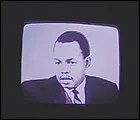
This story transports you from Verwoerdian South Africa and Sophiatown in the 50s, to Harlem in the 60s, under the growing influence of Malcolm X, and the seventh floor of a building in New York from which Nat Nakasa, one of South Africa’s most visionary journalists, plunged to his tragic death, only a year after leaving South Africa on an exit permit. The film is made up of searching and personal interviews and archival material and includes music drawn from the period. Groenewald will present her film on Monday 19th June at 8pm.
Baby Fathers
SA 1999 27min Video
Dir: Kethiwe Ngcobo
For many South African men babies are trophies, proof of their virility. Baby Fathers probes teenage myths of sexuality through the lives of three young ‘men’ who unexpectedly have become fathers, examining the values of SA youth, trying to see the world as they see it. No tale of doom and gloom, Baby Fathers illustrates how the challenge early parenthood propels the lives of three young men in a new direction.
The Gugulethu Seven
SA 2000 105min Video
Dir: Lindy Wilson

This is the story of an ambush. At 5am on 3rd March 1986, police surrounded Crossroads in Guguletu, Cape Town, as ‘terrorists’ planned to attack the 7.25am police bus. However, the bus safely passes, the terrorists’ are sighted and, in as many minutes, seven young men lie dead. Ten years later the tale is unraveled by a team of young investigators for the Truth and Reconciliation Commission, their findings lie at the core of the film. The genre is a detective story. Lies are uncovered, cover-ups identified, encrypted codes are broken. The means by which the real truth is uncovered is the journey of this film – the true story of seven South Africans. Its exposure affirms a culture where, yet again, truth is more compelling than fiction.
The Festival organisers are pleased to host the World Premiere of this film.
Rough Ride
SA 2000 52min Video
Dir: Dumisani Phakathi

Rough Ride takes a personal journey of discovery through the eyes of four pioneers of the taxi industry. Together they reveal the seeds of conflict that would erupt in the minibus blockade protests of 1993 that brought Johannesburg to a standstill. The control of transport systems was integral to the strategies of South Africa’s apartheid regime. Consequently, in South Africa today, the main form of commuter transport is an unsubsidised, aging and war torn minibus taxi fleet. It has grown over seven decades, from the illegal operations of sedans in the 30s to a national transport system that carries over 65% of commuters today. Rough Ride unravels the evolution of the culture of minibus taxis, amidst the madness of apartheid.
The Light Ahead
SA 1967 16min Video
Dir: Anthony Thomas
A little classic about the glorious South African transportation system in the heyday of the National Party Government. Made by the Department of Information, the film depicts three journeys from coast to interior and shows the vast network of roads and rail routes to the industrial centre, Johannesburg. Filled with naive optimism of the 60s, the film abounds with nostalgic references to the Great Trek as we retrace the steps made by the Afrikaner forefathers.
Cinema Verite: Defining the Moment
Canada 1999 102min Video
Dir: Peter Wintonick

This feature is all about the documentary, a fascinating retrospective of some of the century’s finest non-fiction films, and a celebration of the contemporary legacy of the cinema verite movement of the late 50s and early 60s.
The Verite [or direct cinema] movement was driven by a group of rebel filmmakers tired of stilted documentaries. They wanted to show life as it really is: raw, gritty and dramatic. They were responsible for some of the most important technological breakthroughs in modern filmmaking. Part road movie, part history, part celebration, Cinema Verite travels across North America and Europe in search of the Greats who changed the way we see the world. We follow Wintonick and his crew on their own quest for truth: the truth of what really happened during the Verite revolution. Wintonick is the director of the renowned Manufacturing Consent.
Special Ecumenical Award, Berlin International Film Festival Best Canadian Feature, Festival International Nouveau Medias, Montreal.
Sunless [Sans Soliel]
France 1983 100min 35mm
Dir: Chris Marker

Inspired and inspiring, Sunless is quite the best documentary film ever made! It takes the form of a visual letter, here are the musings and recollections of an intelligent, observant and inquisitive man who has been around the world and back. He has a sense of humour, he’s well read and he wants to share with you the wonders he’s seen. He’s taken note of the tiniest details, of apparently insignificant moments that linger, that he knows make for a bigger picture. The primary locus is Tokyo, the people and their customs, the juxtaposition of the intimate neighbourhood festivals and robotic technology. Chris Marker is cinema’s greatest essayist and this dreamy philosophical and sociological experimental film is like nothing you have seen before, it is that rare phenomenon – a demanding but rewarding film experience.
A Time Out Top 100 of the 20th Century. Courtesy of the French Institute in South Africa.
Waiting for Harvey
UK 1999 105min Video
Dir: Stephen Walker

Cannes, festival and market place, appeals most to any filmmaker dreaming of discovery. The most important player on the scene is Harvey Weinstein, the make-a-break mogul of Miramax … if you can get to see him.
Stephen Walker followed four filmmakers through the hustle and bustle of Cannes 1998. James Merendino from Los Angeles, hopes his seventh film SLC PUNK, about the punk rock scene in Salt Lake City, will propel him to fame. Mike Hakata, cans of film on his lap, takes the bus from London. Fellow Londoner Lloyd paints his truck as an advert for his script [about cannabis] and puts his sleeping bag in the back. Frenchman Erick Zonca, director of the acclaimed Dream Life of Angels, is wary of what success can bring. Putting things into perspective, Waiting for Harvey is a comical film about success, money and tinsel.
Battu’s Bioscope
1998 Poland 59min 35mm
Dir: Andrzej Fidyk
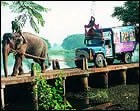
A colourful vehicle with an enormous inscription on the bonnet – Battu’s Bioscope – rambles along the sun scorched Indian roads. Mr Battu is the owner of one of 2 000 mobile cinemas in India. The bioscope comprises of an old Soviet projector and a few sheets of white cloth.
Andrzej Fidyk’s team accompanies them from Calcutta, via fishing villages, snakes hunters’ settlements and a leprosarium, to the distant Orissa province. Mr Battu has finally received a permit, after trying for years, to show films to those who do not even know that cinema exists. Mr Battu is going to be their first introduction to civilization. Battu’s Bioscope shows on a double-bill with Waiting for Harvey.
Grand Prix, Strasbourg, 1998 Golden Spire, San Fransisco, 1999 Grand Prix, Banff 1999.
Hitman Hart: Wrestling with Shadows
Canada 1998 94min Video
Dir: Paul Jay

For a year a film crew followed Bret Hart, five times’ champion of the World Wrestling Federation, hoping for an unprecedented look behind the scenes. What they got was the most dramatic story in the history of wrestling.
Granted unique access, director Paul Jay got beyond the tightly guarded walls of wrestling morality plays. As fantasy crosses into real life, the true story of Hart’s struggle with Vince McMahon, legendary owner of the WWF, is revealed. The climax is the biggest double cross in the history of pro wrestling.
The award winning Hitman Hart is a fascinating film about good and evil, sacrifice and greed, loyalty and betrayal – and a man in a world of moral uncertainty, fighting to keep a sense of personal dignity and truth.
Awarded Best of Festival Hot Docs!
1999 Gold Camera Award US International Film and Video Festival.
Romance de Valentia: Only the Brave
Holland 1993 90min 35mm
Dir: Sonia Herman Dolz

This is an extraordinary film about an extraordinary spectacle: bullfighting. The film challenges the audience to look beyond their preconception of this vainglorious pastime and accept bullfighting for what it is. The man who grows and loves the bulls, the strutting torero and his fearful mother, the women who sew the sequins and brocade, the bulls, the feverish crowd, the blood, the sweat, the breath, the dust, the fear, the fabulous death, the slaughterhouse, the taxidermist. This film is a remarkable portrayal of bravery, of man pitting himself against beast and the celebration of death. Recorded with great respect and craftsmanship, the film takes us behind the scenes into the world that surrounds the fight.
Golden Hugo for Best Documentary, Chicago 1994 Best Documentary Troia 1994
Soul in Torment
Zimbabwe 1999 26min Video
Dir: Prudence Uriri

Independence 1980 means peace and the end of oppression. Yet soon after the celebrations another war begins in Matabeleland. But why when the battle for freedom and justice had been won? Uriri introduces us to a member of the 5th Brigade, a secret army that planned massacres on behalf of the newly formed Zimbabwean Government, whose deeds still torment him. The film examines notions of truth and reconciliation that foreshadow current events in Zimbabwe.
An Act of Faith: The Phelophepa Health Train
SA 2000 26min Video
Dir: Toni Strasburg

An Act of Faith tells the story of the Phelophepa [Good Clean Health] Train that travels to remote areas of South Africa bringing primary health care to impoverished rural people who do not have access to health facilities. This warm, humorous film follows the train’s extraordinary manager, Lilian Cingo, the medical staff, students and patients for 3 weeks during 1999. ‘We are like a big family’, laughs Christiaan Lintnaar the pharmacist ‘and like all families we fight – but then we have to sit with the person over breakfast, lunch and dinner’.
Why Did They Kill Their Neighbours?
Japan 1998 49min Video
Dir: Kumiko Igarashi
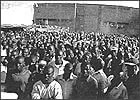
Words can kill. This fascinating and disturbing documentary offers a unique account of the role of Radio Milles Collines in the massacre of 800 000 people. In 1994 Rwanda was torn apart by the attack of the Hutu majority upon the Tsutsi ruling minority. Francois is the first to be released from a prison holding 3000 men accused of genocide. He is the only one to admit to murder. His tragic story unfolds.
Prix Italia for Current Affairs Documentaries 1998.
Narrative of Betrayal
SA 1999 26min Video
Dirs: Craig Mathew & Ronelle Loots

Set in Angola, Narrative of Betrayal explores issues of national identity in a country crippled by internal conflict. Members of the ‘Angolan Group for Reflection on Peace’ meet, on a rooftop in Luanda, to discuss the predicament of their country. What is freedom of thought? Are Angolans still perpetuating colonial will? What went wrong in the transition from socialism to democracy? How is the Angolan identity influenced by European values and the concept of an African Renaissance? What is the vision for the future? The contemplative words of these free-thinkers give shape and meaning to the images of war-torn Angola.
The film examines a society of concentrated pockets of oil and diamond wealth amidst a sea of poverty and corruption. Narrative of Betrayal plays with White Farmer, Black Land in the programme named Aluta Continua.
White Farmer, Black Land
SA / France 2000 57min Video
Dir: Aldo Lee

This film follows Daan Fritz and his family and a few other pioneers as they travel northwards in the footsteps of their Boer ancestors who, two hundred years ago, set out on the Great Trek which has become the founding myth of Afrikaner culture. Thus, the ‘Chosen People’ continues its divine mission: ‘bringing the light of civilisation to the heart of darkest Africa’. In 1994 some white farmers decided to participate in an agricultural development project in Northern Mozambique. But the rich Niassa lands are already occupied by the Yao, who are dead set against letting these rich Afrikaners grab hold of the lands of their ancestors.
JG Strijdom is Very Very Dead
SA 1999 26min Video
Dir: Pule Diphare

In the heart of the administrative capital of the new South Africa, stands a monument to the old order of apartheid in Strijdom Square. With his giant imposing, bronze bust. The authoritative statue is perched under an ominous dome, surrounded by blocks of heavy concrete buildings which celebrated Afrikanerdom in Pretoria. The square, once the domain of white order and supremacy, today has been turned into a commercial center and a haven of ever encroaching black people who have challenged the establishment and declared their freedom under the shadow of Afrikaner pride. JG Strijdom is Very, Very Dead reflects the contradictory feeling of those who live and work in the shadow of the dome. It is a film of paradoxes which captures the changing complexion of a city released from the trappings of a fallen ideology.
SIlver at AVANTI Awards – South African National Television Awards, 2000.
My African Mother
SA 1999 26min Video
Dir: Cathy Winter
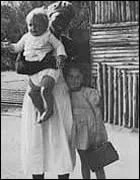
“I remember the forbidden back yard living quarters into which I often transgressed. My secret journey from our tiled and odourless kitchen into the enfolding smell of suurpap, lifebouy soap and bodies contained in that room”. My African Mother examines the relationship between white South Africans and their nannys through personal narrative, interviews with children and their nannys, as well as extraordinary home movie footage from the 1960s and 70s. My African Mother is an eloquent testimony to the relationships that developed between young whites and their “other mothers” and the black children left behind, motherless, in the surrounding peri-urban townships and far flung “homelands”.
AVANTI at AVANTI Awards – South African National Television Awards, 2000.
The Fight
SA 1999 26min Video
Dir: Eddie Edwards

The Fight follows Andile “One by One” Tshongolo as he works towards a challenge for the Western Cape Middleweight Boxing Crown. The film focuses on the relationships between Andile and his trainer, Steve Naude; his employer, Trudy Houareau; his brother, Xolani, his supporters and friends. It culminates in the fight that could set him on the road to the big time. Tshongolo lives in the Marconi Beam squatter camp known as Chukutown, ‘place of trouble’. He works as a groom at Houareau’s Racehorse Stables in Milnerton. Andile turned pro with the intention to box his way out of the township and give his family the opportunities that he did not have.
SIlver at AVANTI Awards – South African National Television Awards, 2000.
Lady was a Mashoza
SA 1999 26min Video
Dir: Nokuthula Mazibuko
Black women, known as abo-mshoza, were part of a township, mainly working class, sub-culture called Isipantsula. Isispantsula had its’ hey-day in the late 70s and early 80s. It was modeled around very expensive clothes, a particular dance style, and members prided themselves in being insolent and disregarding authority. The film focuses on a group of five women, now in their early forties, and their anecdotal reminiscences of their wild youth, set against a backdrop of images of Jo’burg and Soweto in the 70s, intercut with 90s urban life and a vibrant 70s disco music track.
Isibande
SA 1999 26min Video
Dir: Lungiswa Sithole

Isibande takes us on the spiritual journey of a young Amampondo woman and her family as they celebrate her coming of age. We see the completion of a lifecycle, as the older generation of women pass to their daughters and their community the knowledge of a rich cultural and spiritual heritage that will live into the next generation. Filmed in Khayelitsha, Isibande is the directorial debut of Lungiswa Sithole.
The Second Wife
SA 2000 24min Video
Dir: Akiedah Mohamed
The Second Wife reflects the experience of a polygamous Muslim couple in the Western Cape. The participants are frank and honest way in which they talk about the difficulties inherent in polygamy. Whilst Islamic Law permits polygamy, it is clear that justice should form an integral part of the decision to enter into a polygamous union. Couples who are able to deal successfully with such unions, however, remain the exception rather than the rule. The question is not whether polygamy is justified, but how Muslims translate the laws of Islam into everyday existence. A brave, innovative film, about a sensitive issue within the filmmaker’s community.
Music in Islam
SA 1999 26min Video
Dir: Munier Parker
Muslims are divided by issue of whether music, in the celebration of Islam, is permitted or not. There are those who believe that music is not Halaal. Others see music, instrumentation, melody and lyrics as an expression of their devotion to God and a means of bringing Islam to the youth.
Altered States
SA 1999 24min Video
Dir: Carsten Rasch
Thousands of years ago, primordial man discovered a way to talk directly with the gods. By altering their state of consciousness, they could heal the sick, make rain and control the movement of animals. The film makes the connection between San trance dances and the rave scene, and features thought-provoking interviews. It includes unique and beautifully shot footage of people in a trance-state, and is edited to a very trancey soundtrack.
A Letter to my Cousin in China
SA 1999 52min Video
Dir: Henion Han
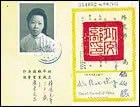
A personal and moving account of a family’s history, the immigrant’s lifelong search for home and one man’s realization of what home means.
Twenty years in the making, the film begins with Han’s parents’ childhood in Hainan, their arranged marriage and tragic separation and their poignant reunion in South Africa 14 years later. It tells of a family’s struggle to forge an identity in a foreign land, as second class citizens during the apartheid years.
The Man Who Would Kill Kitchener
SA 1999 26min Video
Dir: Francois Verster
Fritz Joubert Duquesne, soldier, POW, hunter, explorer, inventor, novelist, saboteur, escapist, filmmaker, fraudster, spy, murderer and certified lunatic, claimed that he was responsible for the death of Kitchener. This film takes the viewer on a sprawling journey that was the life of this illusory figure.
